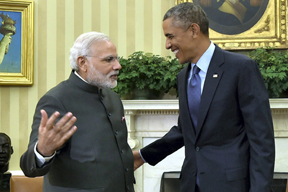
WASHINGTON: Independent American healthcare experts have expressed concern over the decision of India and the United States to establish a high-level working group on intellectual property to address each other’s issues.
They have argued that this is a move by the Obama Administration to push New Delhi on issues related to intellectual property.
Agreeing on the need to foster innovation in a manner that promotes economic growth and job creation, US President Barack Obama and Prime Minister Narendra Modi, in a joint statement have committed to establish an annual high-level Intellectual Property (IP) Working Group with appropriate decision-making and technical-level meetings as part of the Trade Policy Forum.
“This working group will give the US a dedicated forum to continue to pressure India to adopt TRIPS-plus IP measures, including repeal of Section 3(d) of the India Patents Act, adoption of data exclusivity/monopolies, patent term extensions, and restrictions on the use of compulsory licenses,” said Professor Brook K Baker from the Northeastern University School of LAW said.
He argued that there will be efforts to strengthen enforcement measures and investor rights, including investor/ state dispute resolution.
“The US, in particular, will work to eliminate local working requirements that India is seeking to use to promote its own technological development,” he said.
“The fact that this working group will have ‘decision-making’ powers is particularly problematic as it places the US fox in the Indian chicken coop,” he added.
According to a fact sheet issued by the White House after Modi-Obama meeting, as part of an ongoing commitment to strengthen engagement, both governments also agreed to establish a high-level working group on intellectual property under the TPF that will meet at the senior official and expert level to discuss a range of intellectual property issues of concern and interest to both sides.
“It is very clearly going to be used to pressure India to expand liberal grants of drug patents in India, and to block or restrain the use of compulsory licenses on drug patents,” said Jamie Love, Director, Knowledge Ecology International, an NGO working on knowledge governance.
Professor Brook K Baker from the Northeastern University School of Law said the US consistently advances higher intellectual property protections through its trade working and trade partnership groups.
“It is significant that this sentence is embedded in the section on economic growth and increasing foreign direct investment as US IP industries and the USTR promote heightened intellectual property rights and strengthened enforcement mechanisms as being key to investor confidence and ultimately to innovation itself,” he said.
“FDI and innovation are also always rhetorically tied to strong IPRs despite inclusive evidence that typically shows that most low and middle-income countries do not benefit economically from IP maximization since they are net importers of IP goods. -PTI






